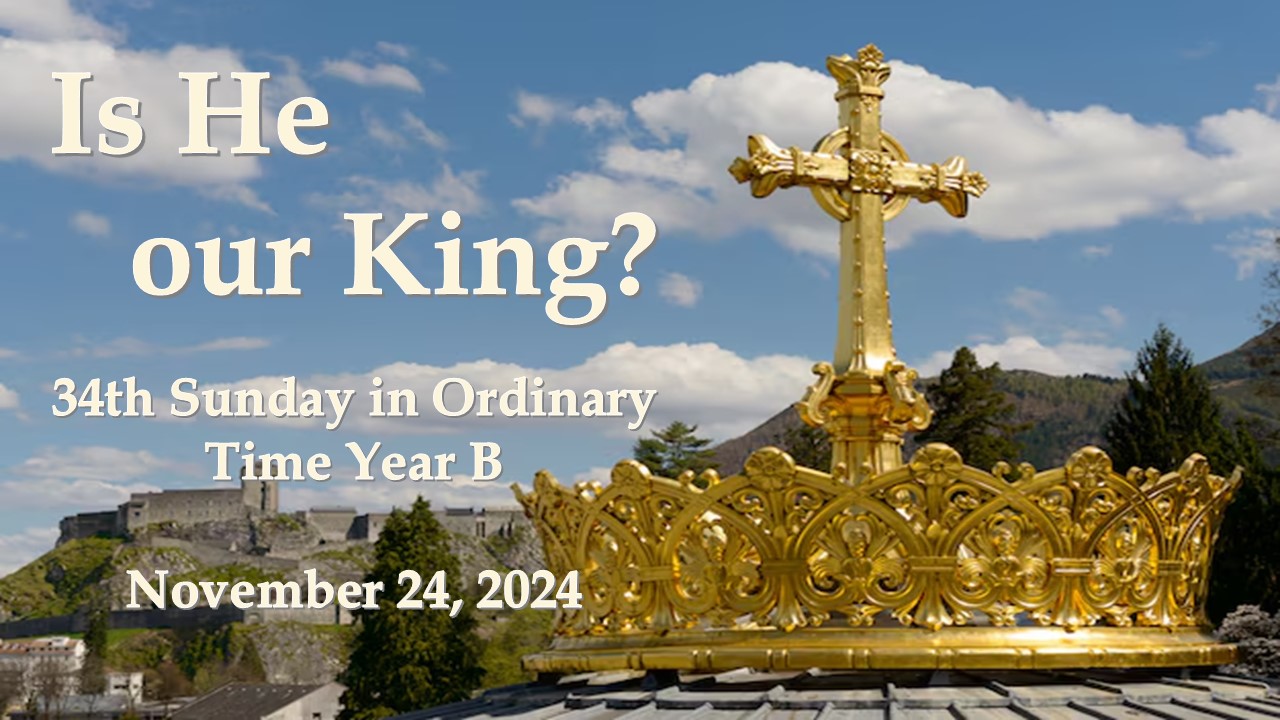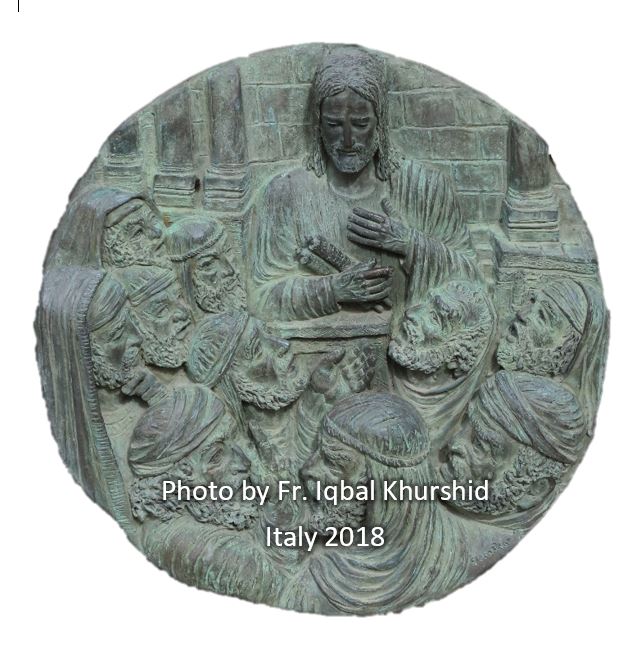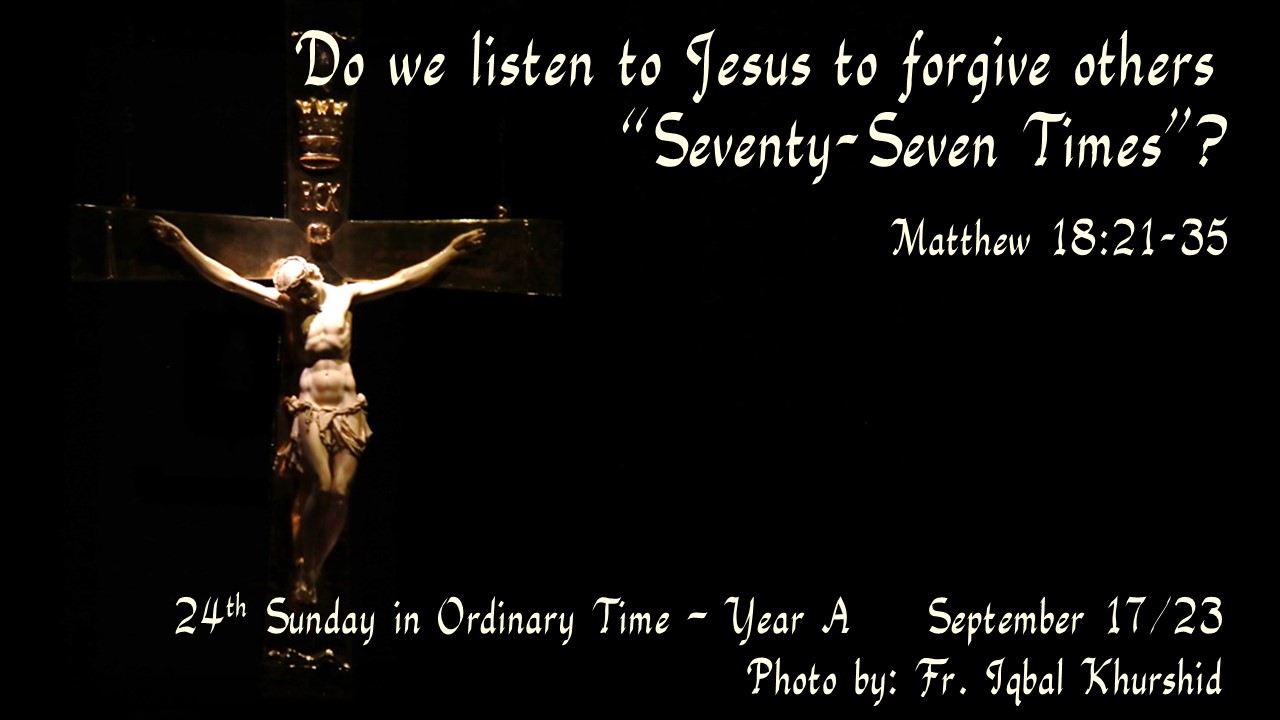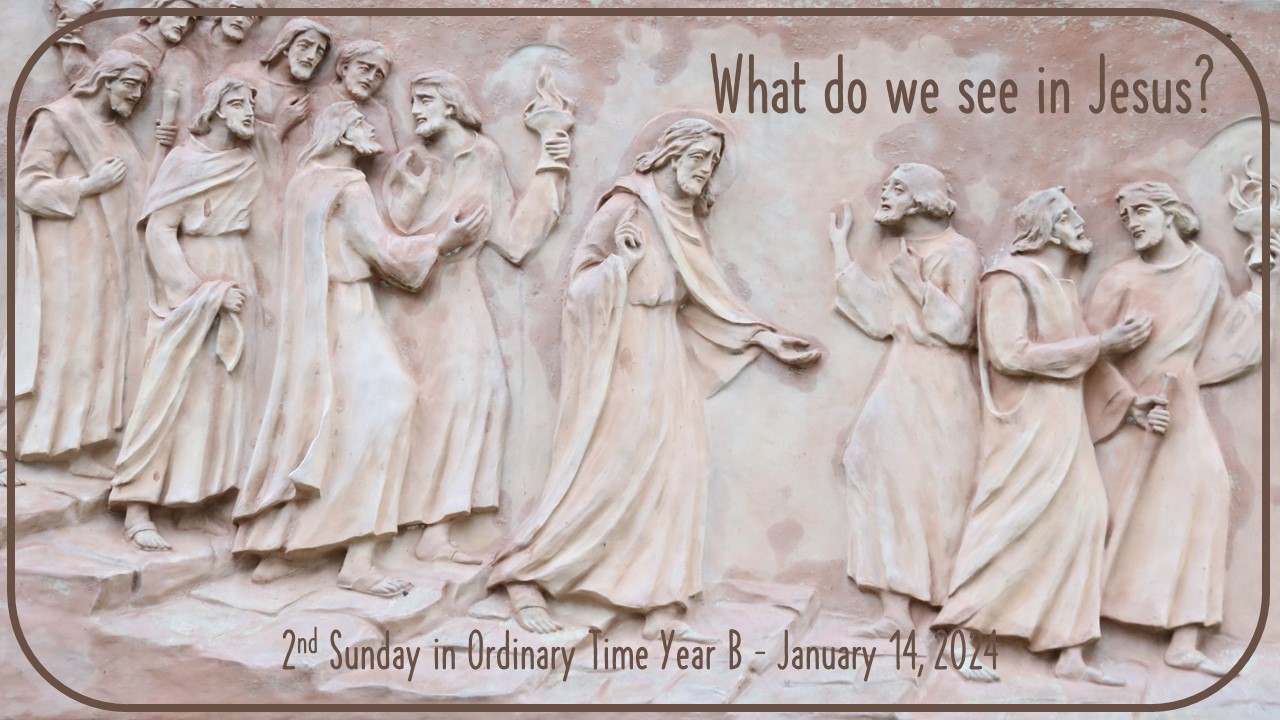
34th SUNDAY IN ORDINARY TIME – YEAR B ~ November 24, 2024
IS HE OUR KING?
Today with the Feast of Christ the King, we conclude the liturgical calendar, Year B. Next Sunday we will begin the new liturgical year with the First Sunday of Advent. The Solemnity of Christ, King of the Universe, which we celebrate today, is set at the conclusion of the liturgical year, and recalls that the life of creation does not advance at random but proceeds toward a final destination: the definitive manifestation of Christ, Lord of history and of all creation. The conclusion of history will be his eternal kingdom. Instituting this Feast of Christ, the King in 1925, Pope Pius XI proclaimed: “Pax Christi in regno Christi” (the peace of Christ in the reign of Christ). This means that we live in the peace of Christ when we surrender our lives to him every day, accept him as our God, Savior and King and allow him to rule our lives.
The following homily was written in the 2nd century warning everyone to take care how we honour our King. “My name is constantly blasphemed by unbelievers, says the Lord. Woe to the man who causes my name to be blasphemed. Why is the Lord’s name blasphemed? Because we say one thing and do another. When they hear the words of God on our lips, unbelievers are amazed at their beauty and power, but when they see that those words have no effect in our lives, their admiration turns to scorn, and they dismiss such words as myths and fairy tales. They listen, for example, when we tell them that God has said: It is no credit to you if you love those who love you, but only if you love your enemies, and those who hate you. They are full of admiration at such extraordinary virtue, but when they observe that we not only fail to love people who hate us, but even those who love us, they laugh us to scorn, and the Name is blasphemed. Therefore, brothers, if we do the will of God the Father, we shall be members of the first spiritual Church that was created before the sun and the moon; but if we fail to do the will of the Lord, we shall be among those to whom it is said in Scripture: My house has been made into a robbers’ den. We must choose then, if we want to be saved, to be members of the Church of life. You surely cannot be ignorant of the fact that the living Church is the body of Christ; for Scripture says: God made man male and female. Now the male signifies Christ, and the female signifies the Church, which, according to both the Old and the New Testament, is no recent creation, but has existed from the beginning. At first the Church was purely spiritual, even as our Jesus was spiritual, but it appeared in the last days to save us”.
The homilist continues to say “For the spiritual Church was made manifest in the body of Christ, to show us that if we uphold its honor in the outward, visible form, and do not defile it, we shall, through the Holy Spirit be made its members in the true, spiritual sense. For the body of the Church is a copy of the Spirit, and no one who defaces the copy can have any part in what the copy represents. In other words, brothers, you must preserve the honor of the body to share in the Spirit. For if we say that the body is the Church and the Spirit is Christ, it follows that anyone who dishonors his body, dishonors the Church. Such a man will have no part in the Sprit, which is Christ. But if the Holy Spirit is joined to it, this body can receive an immortal life that is wonderful beyond words, for the blessings God has made ready for his chosen ones surpass all human powers of description”.
Theologian Origin says “The kingdom of God, in the words of our Lord and Savior, does not come for all to see; nor shall they say: Behold, here it is, or behold, there it is, but the kingdom of God is within us, for the word of God is very near, in our mouth and in our heart. Thus, he who prays for the coming of God’s kingdom prays rightly to have it within himself, that there it might grow and bear fruit and become perfect. For God reigns in each of his holy ones. Anyone who is holy obeys the spiritual laws of God, who dwells in him as in a well-ordered city. The Father is present in the perfect soul, and with him Christ reigns, according to the words: We shall come to him and make our home with him.
Thus, the kingdom of God within us, as we continue to make progress, will reach its highest point when the Apostle’s words are fulfilled, and Christ, having subjected all his enemies to himself, will hand over his kingdom to God the Father, that God may be all in all. Therefore, let us pray unceasingly with that disposition of soul which the Word may make divine, saying to our Father who is in heaven: Hallowed be your name; your kingdom come. Note this too about the kingdom of God. It is not a sharing of justice with iniquity, nor a society of light with darkness, nor a meeting of Christ with Belial. The kingdom of God cannot exist alongside the reign of sin.
Therefore, if we wish God to reign in us, in no way should sin reign in our mortal body; rather we should mortify our members which are upon the earth and bear fruit in the Spirit. There should be in us a kind of spiritual paradise where God may walk and be our sole ruler with his Christ. In us the Lord will sit at the right hand of that spiritual power which we wish to receive. And he will sit there until all his enemies who are within us become his footstool, and every principality, power and virtue in us is cast out”.
He continues to say “All this can happen in each one of us, and the last enemy, death, can be destroyed; then Christ will say in us: O death, where is your sting? O hell, where is your victory? And so, what is corruptible in us must be clothed with holiness and incorruptibility; and what is mortal must be clothed, now that death has been conquered, in the Father’s immortality. Then God will reign in us, and we shall enjoy even now the blessings of rebirth and resurrection”.
Once upon a time there was a poor, old man who lived in a small village. He owned a beautiful white horse. Kings offered fabulous prices for the horse, but the man would say, “This horse is my friend.” The man was poor, but he never sold the horse.
One morning he found the horse was gone from the stable. The whole village gathered and said, “You foolish old man! We knew someday the horse would be stolen. You should have sold it. What a misfortune!” The old man replied, “That’s not necessarily true. The horse is simply not in the stable. This is the fact. Everything else is a judgment. Who knows if it is a misfortune or a blessing?”
People laughed at the old man. They knew he was a little crazy. But after fifteen days, the horse suddenly returned. He had not been stolen but had gone visiting. Not only that, but a dozen also wild horses returned with him. Again, the people gathered and said, “Old man, you were right. The disappearance of your horse is not a misfortune. It has indeed proved to be a blessing.” The old man said, “Again you are going too far. Just say the horse came back. Who knows whether its return is a blessing or not? When you read a single word, how can you judge the whole book?”
The people did not say much, but they knew he was wrong. After all, twelve beautiful horses had come. The old man’s only son started to train the wild horses. But a week later he fell from a horse and broke his legs. The people gathered and again they judged. “You’re right! Getting twelve horses was a misfortune. Your son, who is your only support, has lost the use of his legs. Now you are poorer than ever.”
The old man said, “you are obsessed with judgment. Only say my son has broken his legs. Nobody knows whether this is a misfortune or a blessing. Life comes in fragments, and more is never revealed.”
After a few weeks the country went to war. All the young men in town were forced into the military. Only the old man’s son was left, because he was crippled. The whole town cried because they knew most of the young men would never return. They said to the old man, “you were right. This is a blessing. Your son may be crippled, but he is still with you. Our sons are gone forever.” The old man said again, “Nobody knows! Say only this: Your sons have entered the army and my son has not. We can’t know whether it is a blessing or a misfortune. Stop judging or you will always be obsessed with fragments and live-in faulty conclusions.”
I believe we are receiving the same from the King whose feast we are celebrating today. Jesus being a King, has always been humble in heart who is always compassionate for other. He goes out to find the lost, the marginalized, rejected and outcastes to bring them back to the mercy and love of his Father. Saint Andrew of Crete reflects on his kingship in this way inviting all of us to come to him with converted hearts, minds and souls: “Behold, your king is coming to you, the Holy One, the Savior. Let us say to Christ: Blessed is he who comes in the name of the Lord, the king of Israel. Let us wave before him like palm branches the words inscribed above him on the cross. Let us show him honor, not with olive branches but with the splendor of merciful deeds to one another. Let us spread the thoughts and desires of our hearts under his feet like garments, so that entering with the whole of his being, he may draw the whole of our being into himself and place the whole of his in us. Let us say to Zion in the words of the prophet: Have courage, daughter of Zion, do not be afraid. Behold, your king comes to you, humble and mounted on a colt, the foal of a beast of burden”.
In the First Reading we read about the dream and vision of Prophet Daniel. He is coming with the clouds of heaven. What a wonderful King we have whose divinity and majesty is shown in an amazing way. Everything is handed over to him and everyone is serving him. There is no end to his kingdom because “He is King of Kings” as St. Paul says. The whole Book of Revelation is full of description of his Kingdom, and he is being represented as just King who will just everyone with the rode of justice. As St. Andrew says “He is coming who is everywhere present and pervades all things; he is coming to achieve in you his work of universal salvation. He is coming who came to call to repentance not the righteous but sinners, coming to recall those who have strayed into sin. Do not be afraid then: God is amid you, and you shall not be shaken”.
As the Psalmist says, “the Lord is King; he is robbed in majesty” and indicates that he is a totally different king than the kings of the world who always after the power, are filled with pride, arrogance and selfish motives. His words and decrees are trustworthy and truthful. St. John off course confirms everything in the Second Reading today “Look! He is coming with the clouds; every eye will see him, even those who pierced him; and on his account all the tribes of the earth will lament”. He is Alpha and Omega, who is and who was and who is to come, the Almighty. If he is our King, then how should we receive him? St. Andrew makes it easy for us “Receive him with open, outstretched hands, for it was on his own hands that he sketched you. Receive him who laid your foundations on the palms of his hands. Receive him, for he took upon himself all that belongs to us except sin, to consume what is ours in what is his. Be glad, city of Zion, our mother, and fear not. Celebrate your feasts. Glorify him for his mercy, who has come to us in you. Rejoice exceedingly, daughter of Jerusalem, sing and leap for joy. Be enlightened, be enlightened, we cry to you, as holy Isaiah trumpeted, for the light has come to you and the glory of the Lord has risen over you. What kind of light is this? It is that which enlightens every man coming into the world. It is the everlasting light, the timeless light revealed in time, the light manifested in the flesh although hidden by nature, the light that shone round the shepherds and guided the Magi. It is the light that was in the world from the beginning, through which the world was made, yet the world did not know it. It is that light which came to its own, and its own people did not receive it.
And the Gospel of this Sunday gives us totally and beyond comparison the description of the Divine King. St. John presents him as a suffering king who suffers for us so that we can be saved. History of the world reveals that whoever became king, made other people to suffer and sacrifice their lives them but he “came not to be served but serve other and lay his life for the ransom of other. He is a king whose glory we can see on the cross. And what is this glory of the Lord? Clearly it is the cross on which Christ was glorified, he, the radiance of the Father’s glory, even as he said when he faced his passion: Now is the Son of Man glorified, and God is glorified in him, and will glorify him at once. The glory of which he speaks here is his lifting up on the cross, for Christ’s glory is his cross and his exaltation upon it, as he plainly says: When I have been lifted, I will draw all men to myself.
Jesus as he introduces himself to Pilate as king of a kingdom that “is not of this world”. This doesn’t mean that Christ is the king of another world, but that he is king in another manner, but he is king in this world. It is a contrast between two types of logic. Worldly logic is based on ambition, competition, it fights using the weapons of fear, extortion, and the manipulation of consciences. On the other hand, the logic of the Gospel, that is, the logic of Jesus, is expressed in humility and gratuitousness. It is silently but effectively affirmed with the strength of truth. The kingdoms of this world at times are sustained by arrogance, rivalries, and oppression; the reign of Christ is a “kingdom of justice, love and peace”.
When did Jesus reveal himself as king? In the event of the Cross! Those who look at the Cross cannot but see the astonishing gratuitousness of love. For a Christian, speaking of power and strength means referring to the power of the Cross as St. Paul says, “But for us is a sign of salvation”, and the strength of Jesus’ love: a love which remains steadfast and complete, even when faced with rejection, and it is shown as the fulfilment of a life expended in the total surrender of oneself for the benefit of humanity. On Calvary, the passers-by and the leaders derided Jesus, nailed to the Cross, and they challenged him: “Save yourself, and come down from the cross!” “Save yourself!”. Had Jesus come down from the Cross, he would have given in to the temptations of the prince of this world. Instead, he cannot save himself precisely to be able to save others, precisely because he has given his life for us, for each one of us. To say: “Jesus gave his life for the world” is true. But it is more beautiful to say: “Jesus gave his life for me”. Let each one of us say in heart: “He gave his life for me, in order to save each one of us from our sins”.
As Jesus is telling about his Kingdom which is not based on war, oppression, rejection, violence but on love. He wants us to work for the same kingdom as we say during the prayer of Our Father “Thy Kingdom come” so that people can feel. It is easy to run after power and control but very difficult to follow the path of service and love. Let us listen to the voice of the Lord and keep praying “may your kingdom come” so we may work together to make this world peaceful.
Let me end my reflection with this inspirational to see who our king is. The Psalmist says “who is the king of glory? The Lord, strong and mighty, the Lord, mighty in battle….” (Read Psalm 24).
One day King Henry the Fourth of France was hunting in a large forest. Towards evening he told his men to ride home by the main road while he went by another way that was somewhat longer.
As he came out of the forest he saw a little boy by the roadside, who seemed to be watching for some one.
“Well, my boy,” said the king, “are you looking for your father?”
“No, sir,” answered the boy. “I am looking for the king. They say he is hunting in the woods, and perhaps will ride out this way. So, I’m waiting to see him.”
“Oh, if that is what you wish,” said King Henry, “get up behind me on the horse and I’ll take you to the place where you will see him.”
The boy got up at once and sat behind the king. The horse cantered briskly along, and king and boy were soon quite well acquainted.
“They say that King Henry always has a number of men with him,” said the boy; “how shall I know which is he?”
“Oh, that will be easy enough,” was the answer. “All the other men will take off their hats, but the king will keep his on.”
“Do you mean that the one with his hat on will be the king?”
“Certainly.”
Soon they came into the main road where a number of the king’s men were waiting. All the men seemed amused when they saw the boy, and as they rode up, they greeted the king by taking off their hats.
“Well, my boy,” said King Henry, “which do you think is the king?”
“I don’t know,” answered the boy; “but it must be either you or I, for we both have our hats on.”
In the Gospel of Luke, our Saviour says “‘No one can serve two masters; for a slave will either hate the one and love the other or be devoted to the one and despise the other. You cannot serve God and wealth”. (6:24).
Whom do we serve and who is our King?
Other Sermons In This Series

7th Sunday in Ordinary Time Year C – February 20, 2022
February 18, 2022

24th Sunday in Ordinary Time – Year A ~ September 17, 2023
September 13, 2023

2nd Sunday in Ordinary Time Year B ~ January 14, 2024
January 11, 2024

